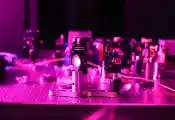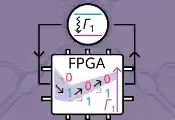UNM Receives $1M in NSF Funding for Quantum Photonics Computer Research
August 28, 2024 -- Quantum researchers at The University of New Mexico and New Mexico State University received a $1 million grant from the National Science Foundation to research the development of a photonic quantum computer that can operate at room temperature in a pilot program titled “Quantum Computing Applications of Photonics.”
The pilot project, which began Aug. 15, is one of five nationwide to receive funding as part of the NSF’s National Quantum Virtual Laboratory (NQVL), a national program to enable the development of quantum technologies. Other projects selected for NQVL funding are led by Stony Brook University, Duke University, Massachusetts Institute of Technology, and University of California Los Angeles.
Most quantum computers can only operate at extremely low temperatures, but the use of Gaussian boson sampling and photonics implementation could help researchers develop a computer with quantum power that is operational at room temperature. Gaussian boson computers have been developed before but have more closely resembled optical tables found in laboratories than the devices most people regard as computers. The team aims to develop the technology as a fully integrated chip.
The NSF NQVL pilot funding is the first phase of what will evolve into several competitive funding stages and is intended for development of the design phase of the NQVL initiative. The team has already implemented a plan for program management with the help of UNM’s Anderson School of Management to help them plan for collaborations with other organizations and eventual expansion.
The first year of research will focus on the development of key components of a Gaussian boson sampling computer, including electrically pumped quantum dots, which are semiconducting objects of less than 100 nanometers in size, that will emit entangled photon pairs, a network of tunable Mach-Zehnder interferometers, and dynamically biased avalanche photodiodes.




































